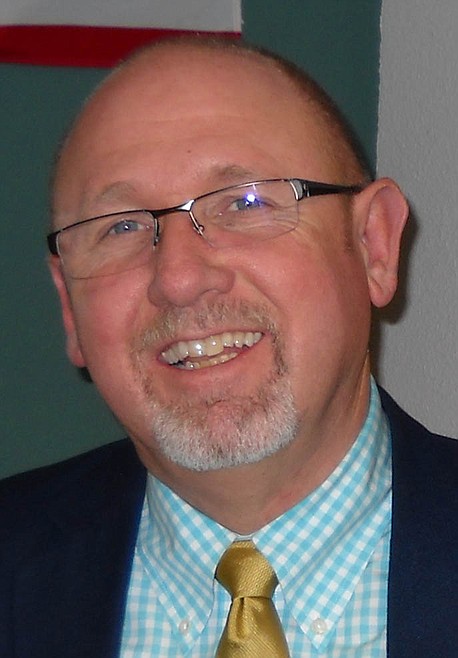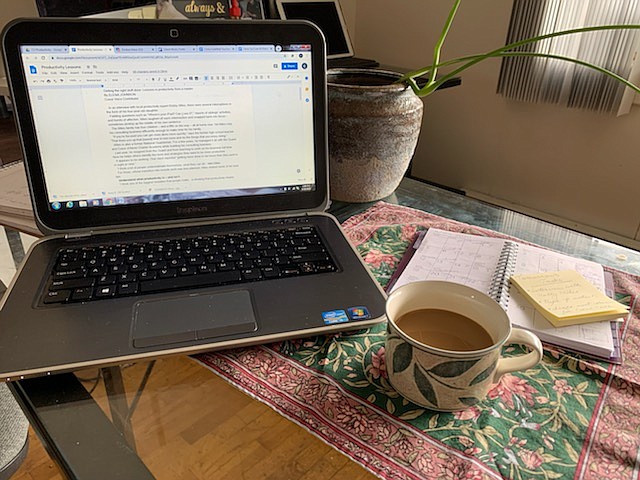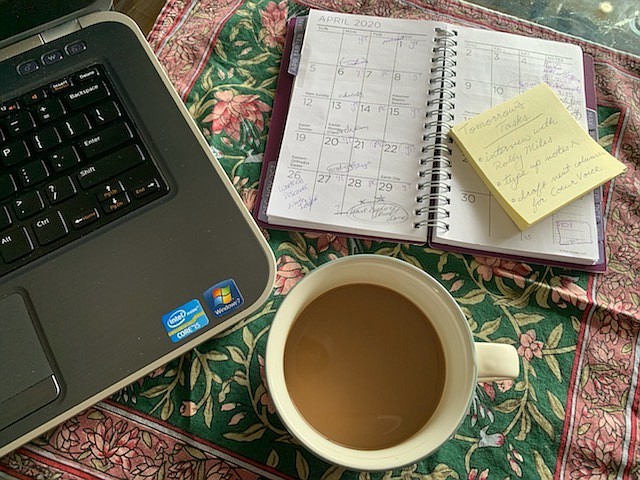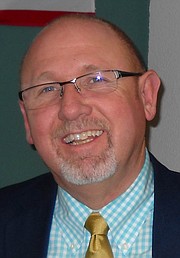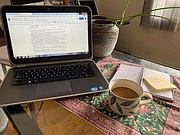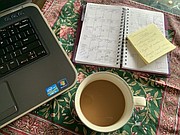Getting the right stuff done: Lessons in productivity from a master
In an interview with local productivity expert Robby Miles, there were several interruptions in the form of his four-year-old daughter.
Fielding questions such as “Where’s your iPad? Can I use it?,” reports of siblings’ activities, and bursts of affection, Miles laughed off each intermission and snapped back into focus – sometimes picking up the middle of his own sentence.
The Miles family has four children – and a fifth on the way – all at home now. Yet Miles runs his consulting business efficiently enough to make time for his family.
“If you’re focused you can get more done more quickly,” says the former high school teacher. “That frees you up that [saved] time to rest more and do the things that you enjoy doing.”
Miles is also a former National Guardsman. For a few years, he managed it all with the Guard and Coeur d’Alene Charter Academy while building his consulting business.
Last year, he resigned from the Guard and from teaching to work on his business full time. Now he helps others identify the tools and strategies they need to be more productive.
It appears to be working. One client reported “getting more done in six hours than [he] used to in eight or nine.”
“I think a lot of people underestimate themselves, what they can do,” said Miles.
For those continuing to work remotely, Miles shared some of his best tips – many of which apply to any working situation.
Understand what productivity is – and isn’t
“I think one of the biggest mistakes that people make…is thinking that productivity means checking the most things off their lists,” said Miles. “Whereas true productivity means checking the right things off your list.”
A productive day might mean checking a single thing off your list. But if that one thing has a bigger effect down the line, accomplishing that one task could be more effective than finishing several unimportant ones.
Stick to a routine
This one is especially relevant for remote work.
“Having a routine at your house is really important,” said Miles. “When I first started working remotely I was burning myself out even though I was getting all my work done.”
“Trying to still keep some sort of schedule is really important because it keeps you honest to yourself about setting boundaries with your time.”
Fernan Elementary principal and psychologist William Rutherford underscored this idea.
“Normalcy is super important. If a person can keep to a schedule like the one they had while traditionally working [before], one might find less stress in changing work situations.”
On the other hand, Rutherford acknowledges that a new normal may be beneficial, particularly for those who find “normalcy” more stressful to maintain than to abandon.
For those who’ve found little success with their old normal, Rutherford suggests “a 180-degree change.”
“If working at a desk traditionally, move one’s workstation to the deck or at a picnic table at the beach and make that one’s new office,” said Rutherford.
“[Or] change your relationship with coworkers and meet online after ‘business hours’ to have a non-work related conversation.”
When working from home, it’s easy to always be “on,” but routines help create boundaries between work and leisure time. Miles suggests setting a firm end time for the day’s work, for those whose hours aren’t scheduled already. Enforcing an end to the work day helps hold you accountable to both work projects and personal downtime.
Miles suggests creating a shut-down routine for the day’s end, including tasks such as clearing out emails in 15 minutes and deciding what to prioritize the next day.
“That way I’m not thinking about it tonight,” he said.
Miles also builds in breaks and “mindfulness checks” throughout the day. This may be as simple as reminding yourself to eat at regular intervals.
“That was a big one when I first started working remotely,” said Miles. “It’s so easy to get wrapped up into your computer and your work…that you forget about your biology.”
Of course, any worker can benefit from a quick break - and keeping fueled.
‘Batching’ and building a work routine around your natural energy levels
“Everything has cycles and flows, even your day,” said Miles. “You can start separating your tasks by your energy level.”
“When you’re not as tied to a calendar and you have some space to find your routine, you might find that your energy is different at different times of day.”
Similar activities can be “batched” and completed during their optimal times.
With naturally high energy early in the morning, the former Guardsman prioritizes his most creative work when most people are still asleep. The post-lunch energy slump is a great time for less brain-heavy tasks like clearing emails.
Recreating the daily commute
For those at home, “you still need transition times,” Miles says.
“You need time to decompress from what just happened and moving into what’s happening now.”
One of his team members has reintroduced a physical commute to his work-from-home routine. Each work day begins and ends with a 15 minute walk.
A transition can also be as straightforward as listening to a podcast between getting up in the morning and beginning work.
“It’s such a simple thing, but it’s the space we need to transition,” Miles explained.
Give yourself motivation
One way to stay motivated is by setting deadlines. Miles suggests trying the “pomodoro technique,” based on the idea of setting an old tomato (pomodoro in Italian) shaped kitchen timer, for, say, the 25 minutes it might take to bake a pie. After accomplishing as much as possible before time runs out, you take a five minute break.
“You spend 30 minutes…It’s kind of a race against the clock and then you take a break,” said Miles.
“It’s really effective because people work best against a deadline. It’s kind of what we talked about [regarding] boundaries around work.”
Rest to be productive
At the same time, however, Miles says you shouldn’t underestimate the need for rest.
“You have to have scheduled rest and downtime.”
However, not all rest looks the same. For “knowledge workers” especially, physical activity may be the best rest – whether that’s going for a quick walk, playing catch with your kids, or even painting the house.
“Rest is a skill,” added Miles. “Four to six hours a day…is what they’ve determined is the maximum amount of time that your brain can work productively.”
“And the only way to sort of stretch that out is to have some kind of active rest.”
Of course, ‘regular’ rest is crucial, too.
“There is a huge amount of evidence that suggests one must be well-rested to reach one’s full potential. Lack of sleep equates to working while high or intoxicated,” Rutherford warned. “One’s brain is operating at less than full capacity when one is not fully rested. So, if nothing else, start on an even playing field and sleep.”
Perhaps most important for those new to working at home or those struggling with productivity, said Miles, is giving yourself grace.
“When I first started working remotely I thought, ‘Oh, this will be easy. I’ll just do everything like I was before except for now I do it from my house.’”
Instead, Miles had to learn much of these tips for himself the hard way – despite already being a productivity guru. Redefining boundaries between home and at-home-work and communicating expectations with his wife and family helped smooth the way to remaining productive.
“You’ve got to grant yourself a little bit of permission to mess up sometimes, too,” he said. “Nobody’s going to get it right [at first].”
“The other part of that is saying yes to spontaneity more often, if you’re able to,” Miles added. “Lean into these times and appreciate them and be spontaneous a bit.”
When Miles adjusted to working remotely last summer, he sometimes chose to finish work at night in order to play his children during the day. An interruption from a loved one could turn into an unscheduled break – and unprecedented memories.
After all, one of the motivations to be productive for many is to have more time for what’s important. And for some, productivity, values, and purpose are all closely related.
“[I once read] ‘You can learn a lot about somebody by looking at two documents: their checkbook ledger and their calendar,’” said Miles.
“People will tell you they prioritize this thing or that thing, but if they haven’t set aside time in their calendar or money in their checkbook to do it, it raises the question, ‘Is that actually a value?’”
“Productivity equates to purpose,” said Rutherford.
“From a mental health perspective, when one makes a difference in the life of oneself or in the life of others, one then has purpose, existentialism; a reason to exist.”
As Miles says, while work and schedules are being reconfigured in these uncertain times, we’re really figuring out what matters most.


